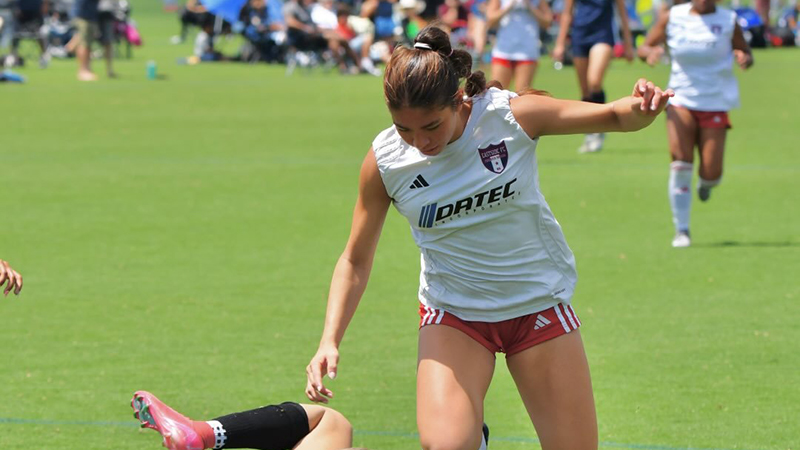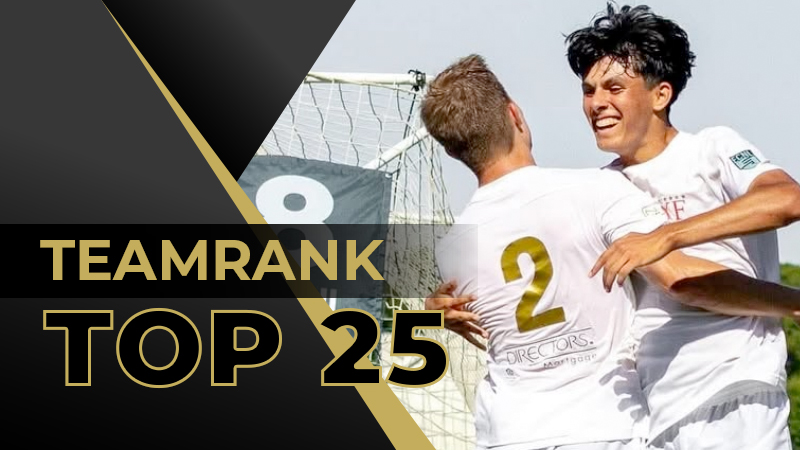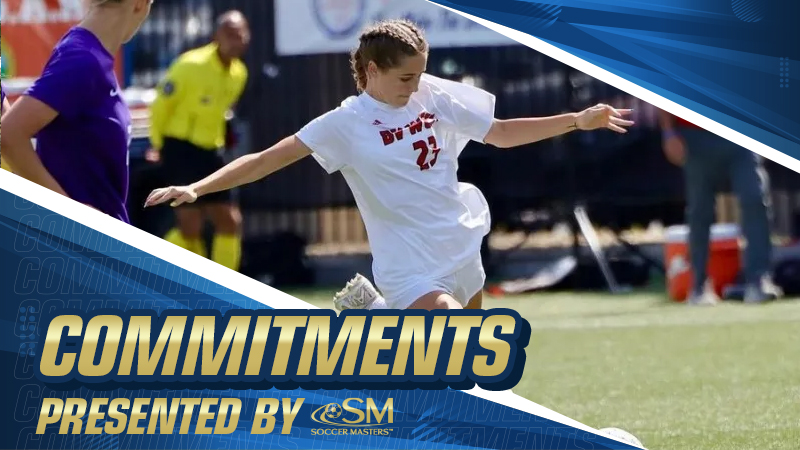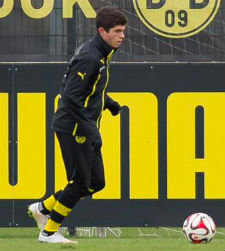 Pulisic training with BVB's first team
Pulisic training with BVB's first teamPulisic's U.S. odyssey only just beginning
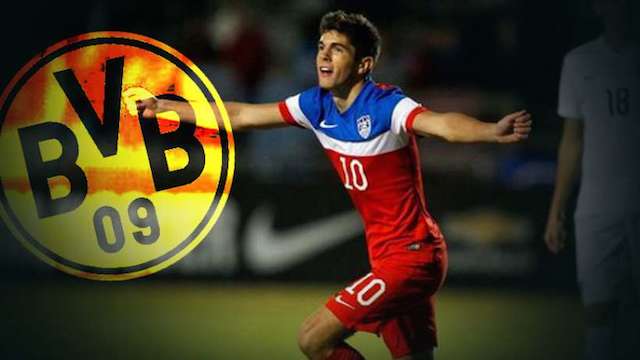
After a journey of several thousand miles and a professional courtship of nearly two years, Christian Pulisic could hardly believe where he stood. The sod of Borussia Dortmund’s training pitch underfoot, Pulisic, enrobed in black and yellow BVB training gear, took one-on-one instruction from an exuberant man with thick ropes of hair spilling from the sides of a lemon-yellow hat over a grizzled beard flecked with gray.
That man was Jurgen Klopp, the architect of Borussia Dortmund’s rise to prominence and one of the most respected coaches on the planet. The 16-year-old Pulisic had officially arrived in Europe. And it could hardly have been accompanied by a more auspicious beginning.
 Pulisic training with BVB's first team
Pulisic training with BVB's first teamSince first arriving in Germany toward the end of last summer, life has flown at Pulisic in barely digestible chunks. But as of this month, the endlessly creative central attacking midfielder is officially eligible to join Borussia Dortmund at a competitive level. At least for now, he’ll spend most of his time with BVB’s U17 squad, with occasional training stints and friendly appearances with the U19 team sprinkled into the mix.
A recent training stint with the senior team earlier this month - including his first crack at on-field instruction from Klopp himself - brought the journey into perspective for Pulisic. From Hershey, Pennsylvania to Dortmund, Germany? The moment was a lot to synthesize.
“It was incredible,” said Pulisic, who turns 17 in September. “Just seeing guys like that, you’ve watched them play on TV in the Champions League and big tournaments and leagues. It was pretty amazing seeing how good they are, and all the little things; how strong they are and how it’s just a whole new level I want to work to be at one day.”
Right now, Pulisic is in San Pedro Sula, Honduras with 19 of his teammates to take part in the U17 CONCACAF Championships, which the U.S. kicks off Friday against Cuba. The top four finishers make their way to the U17 World Cup in Chile later this year, and this tournament is of particular interest to the Americans. The U.S. failed to qualify for the 2013 U17 World Cup, the first time an American team had ever missed the world’s biggest tournament at this age since it was instituted in 1985. After winning a handful of trophies in this cycle, this particular team is hungry to forge its own path.
Pulisic may be the team’s fastest riser and most promising professional prospect. While teammates like Luca de la Torre (Fulham) and Danny Barbir (West Bromwich Albion) strive to make their mark on European clubs from a young age, nobody’s club situation boasts the same kind of international cachet as does Pulisic’s. While Dortmund has struggled in the top flight this year, its lineage producing world class players is undeniable. Mario Gotze, the classy midfielder who scored the winning goal for Germany in the 2014 World Cup final, joined Dortmund’s academy as an 8-year-old.
Pulisic is in Gotze’s general mold, which should hearten American fans hopeful that one of the few true No. 10 prospects in the pipeline will have every opportunity to develop into a future first teamer. Dortmund’s lineage of quality attacking midfielders doesn’t hurt either. Klopp’s comments after Pulisic’s training stint certainly shoveled coal into a hype train that seems to gain more speed with each passing week.
“We were missing his position and that’s why we called him up,” Klopp said in a press conference. “He did a good job. Pulisic is part of that generation. He’s a great footballer, an attacking midfielder. He can kick the ball around really well. And in a very intense training session with narrow spaces, he did not stand out in a negative way. This is a real sign of quality.”
MORE: U.S. U17 Men's National Team qualifying coverage
Pulisic was first identified by Dortmund at the 2013 Nike International Friendlies in Florida, where he was named the tournament’s MVP. Pulisic enjoyed a rampant week as the U.S. ran roughshod over Brazil in the final to win the title. The club wasn’t alone in its interest, as PSV in Holland in particular made a compelling pitch of its own. But Dortmund scouts traveled to watch Pulisic put on another attacking clinic in the U.S. U17 team's 3-0-1 run at the Aegean Cup in Turkey less than a month later. From then on he was more or less sold.
Toward the tail end of last summer Pulisic moved to Dortmund with his father, Mark, and the two live in an apartment together not far from the Borussia Dortmund training center. While Mark works with younger players at the club, Pulisic goes to a ”full-on German school” during the day before training, which means he’s had to learn German on the fly. It hasn’t always been easy.
“It was really tough at first, just knowing I have to pretty much start over and I have to earn everything for my soccer career in that way because no one knows who I am,” Pulisic said. “I have to earn everything. Obviously the language barrier is a big thing, and being away from family and close friends. It was definitely tough.”
Earning his stripes on the field hasn’t been an easy task either. There aren’t many Americans in elite developmental institutions in Europe, so in a lot of ways Pulisic is fighting an international stigma that young American players aren’t up to the standard. The way he sees it, he’s changing more minds every day.
“I think kids on the team, they’re not just going to want a new American kid to come in there and take their spot,” Pulisic said. “Kids aren’t going to like that. It’s tough. The other kids, they’re nice about it, they know I have the same goals they do. But I think it can be especially tough for American kids going over there.”
Pulisic’s grandfather Mate is a Croatian native who emigrated to the U.S., and Pulisic is still in the process of obtaining his Croatian passport, which he said “is processing” and should be finished, “we’re hoping shortly.” While Pulisic is largely doing it to help ease his transition into Europe, the Croatian FA took it as an opportunity to press its claim. Last November, Croatian U17 coach Luka Pavlovic confirmed to publication CroatiaWeek that they’d touched base.
“He can play for Croatia, the question is will he,” Pavlovic said. “Croatian FA technical director Romeo Jozak has spoken to him and his family, for now the answer is negative, but we are not giving up.”
While Pulisic had never represented Croatia and has spent his entire developmental career in the U.S., that sparked doubt as to whether a consistent World Cup team like Croatia with history producing top players had a shot at winning his allegiance. Less than a week after the report emerged, Pulisic tweeted out a photo of the American flag. At least for now, he has no plans to join Croatia.
“I’ve been playing with the USA my whole life,” Pulisic said. “I grew up here, and it’s the country I want to play for. I don’t see myself anywhere else at the moment.”
For now, Pulisic’s increasingly diverisifed attention is squared on the U17 CONCACAF Championships. San Pedro Sula is statistically one of the most dangerous cities in the world, so the team will largely be ferried to and from training and games without many side quests. Which, he says, will only help generate focus for a team guided by one of the most exciting prospects to funnel through the U.S. national team youth ranks in some time.
“I’d say from living two years together in residency, all the guys have just been together, it’s just that familiarity,” Pulisic said. “Nothing can really break us apart. We stick together. No guys don’t get along or have problems with each other. We all have the same goal.”
Headlines
- Recruiting Roundup: February 9-15
- Professional Signing Tracker: 2025-26
- 2026 Women's Division I Transfer Tracker
-
ECNL Texas Girls U19 Prospects to Watch

- TopDrawerSoccer TeamRank Update - Boys
-
Commitments: North to North Dakota

-
Newcomers to Know in the U16 GNT Roster

- Orlando Cup: 20+ Brazilian Teams Confirmed
-
N. Academy Championships: U17 Preview

-
ECNL Texas Girls U17 Prospects to Watch


